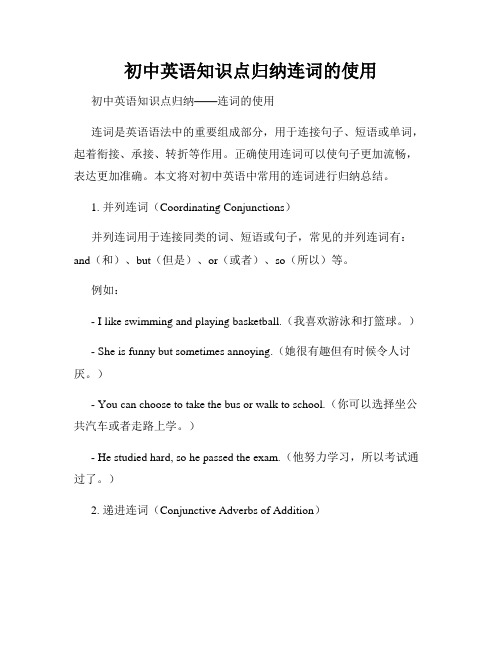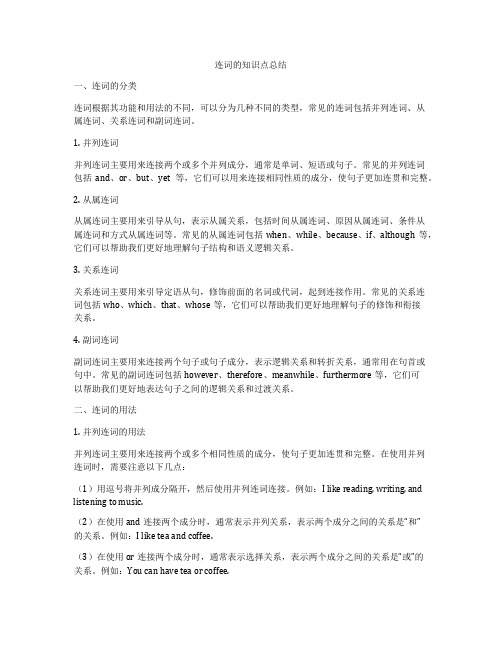英语语法大攻克--连词讲解
英语连词成句技巧讲解

英语连词成句技巧讲解英语是一门语言,而语言的表达需要一定的语法结构。
连词是英语语法中重要的一部分,它可以帮助我们把句子组织起来,使句子更加完整、准确、连贯。
本文将为大家介绍英语连词的使用技巧,希望能够帮助大家更好地掌握英语语法。
1. 并列连词并列连词是一种连接并列关系的连词,常见的有and、but、or 等。
and表示“和”,连接两个同等重要的并列成分;but表示“但是”,连接两个相反的并列成分;or表示“或者”,连接两个选择中的并列成分。
具体使用时需要注意以下几点:(1)and连接的两个成分必须同等重要,否则需要使用其他连词。
例如:I like reading books and watching movies.(我喜欢读书和看电影。
)(2)but连接的两个成分必须相反,否则需要使用其他连词。
例如:She is beautiful but not very smart.(她很漂亮但不是很聪明。
)(3)or表示选择中的两个成分,一般使用在否定句中。
例如:I don't know if he is coming or not.(我不知道他是否来。
)2. 从属连词从属连词是一种连接主句和从句的连词,常见的有that、if、when、because等。
that引导的从句常用于陈述事实或者引用别人的话;if引导的从句常用于表示条件或者假设;when引导的从句常用于表示时间;because引导的从句常用于表示原因。
具体使用时需要注意以下几点:(1)that引导的从句中,that可以省略,但是从句的语序不能变。
例如:I know he is a good student.(我知道他是个好学生。
)(2)if引导的从句中,if可以换成whether。
例如:I don't know if he is coming.(我不知道他是否来。
)(3)when引导的从句中,when可以换成while。
例如:I like listening to music when I am doing my homework.(我喜欢在做作业的时候听音乐。
英语连词ppt课件

避免冗余
在句子中避免使用过多的从属连词 ,以免使句子结构过于复杂和冗余 。
注意语气和语义
从属连词具有不同的语气和语义, 需要根据语境选择合适的连词,以 使句子更加自然、流畅。
04 转折连词
转折连词的种类
01
02
03
04
but:表示意义上的转折 ,常用于对比或强调。
however:表示轻微的 转折,常用于句子的开 头或中间。
连接作用
连词的主要作用是连接句子中的各个部分,使它们形成一个有机的整体。
转折、递进、因果等关系
连词还可以表示转折、递进、因果等逻辑关系,使句子更加丰富和有层次感。
常见英语连词列表
并列连词
and, or, but, so, yet, neither等。
从属连词
that, which, who, whose, whom, when, where, how等。
用于引导从句,如that、 which、who等。
转折连词
用于表示意思的转折,如 however、nevertheless等
。
条件连词
用于表示条件关系,如if、 unless、provided等。
选择连词的用法
01
02
03
04
根据语境选择合适的连词,使 句子意思更加清晰、连贯。
注意连词的正确形式,如时态 、语态等。
转折连词的注意事项
注意转折连词的使用 场合,避免在不适合 的语境中使用。
注意转折连词的搭配 ,避免使用不恰当的 搭配。
注意转折连词的语气 和情感色彩,选择合 适的转折连词来表达 意思。
05 选择连词
选择连词的种类
01
02
03
最全面的英语连词的用法

用于句首 But in secret she was delighted. 但她暗中感到高兴。 But what else can we do? 我们还能做什么? 用于道歉的表达之后 Sorry, but we’re behind schedule. 抱歉,我们落在计划后了。 I’m frightfully sorry, but I can’t see you today. 太对不起了,我今天不能见你
She’s a bank manager and I’m just a road-sweeper. 她是银行经理,而我不过是个扫街的。
有时用于连接两个相同的词语,主要有以下用法:
连接两个相同的比较级,表示“越来越……”。如:
The weather is getting colder and colder. 天气越来越冷了。
01
连词and 用法方方面面
连词and 用法方方面面
(4) 连接两个相同的名词,有以下两种主要用法: ①表示“许多”。如: They talked for hours and hours. 他们谈了很长很长时间。 The road went on for miles and miles. 这条路很长很长。 ②强调差别,意为“与……不同”。如: Don’t worry there are rules and rules. 别担心——规则跟规则不一样。 I like city life but there are cities and cities. 我喜欢城市生活,但城市之间也有差别。
连词and 用法方方面面
另外,在come, go 之后的 and 有时可以省略(尤其在美国英语中)。如:
用在祈使句后,表示结果,意为“那么”(暗示一种条件)。如:
初中英语知识点归纳连词的使用

初中英语知识点归纳连词的使用初中英语知识点归纳——连词的使用连词是英语语法中的重要组成部分,用于连接句子、短语或单词,起着衔接、承接、转折等作用。
正确使用连词可以使句子更加流畅,表达更加准确。
本文将对初中英语中常用的连词进行归纳总结。
1. 并列连词(Coordinating Conjunctions)并列连词用于连接同类的词、短语或句子,常见的并列连词有:and(和)、but(但是)、or(或者)、so(所以)等。
例如:- I like swimming and playing basketball.(我喜欢游泳和打篮球。
)- She is funny but sometimes annoying.(她很有趣但有时候令人讨厌。
)- You can choose to take the bus or walk to school.(你可以选择坐公共汽车或者走路上学。
)- He studied hard, so he passed the exam.(他努力学习,所以考试通过了。
)2. 递进连词(Conjunctive Adverbs of Addition)递进连词用于表示递进关系,连接两个准确的不同观点,常见的递进连词有:furthermore(而且)、in addition(此外)、moreover(此外)等。
例如:- He is smart. Furthermore, he is also hardworking.(他聪明而且也很努力。
)- I have finished my homework. In addition, I have also cleaned my room.(我已经完成了作业,此外我还打扫了房间。
)- The book is interesting. Moreover, it is also educational.(这本书有趣,而且还很有教育意义。
)3. 转折连词(Conjunctive Adverbs of Contrast)转折连词用于表示转折、对比、否定关系,连接两个相反或对立的观点,常见的转折连词有:however(然而)、but(但是)、yet(然而)等。
连词知识点难点总结

连词知识点难点总结连词,是连接词语、词组、句子的一类词,其作用是连接并列的成分或句子,在表达语义关系上起到了重要的作用。
在英语语法中,连词的种类较多,使用方法也较为灵活,因此在学习和运用连词时,会遇到一些难点和问题。
一、连词的种类1. 并列连词并列连词用于连接两个或多个并列的词、词组或句子,表示并列关系。
常见的并列连词有and, or, but, so等。
例如:- I like reading and writing.- You can have tea or coffee.- She is rich, but he is poor.- The weather is fine, so we can go out for a walk.2. 从属连词从属连词引导从句,表示从属关系,依附于主句。
常见的从属连词有because, although, when, if等。
例如:- I will go to bed because I am tired.- Although it is raining, we will go out for a walk.- When he arrives, please tell him to call me.- If you need any help, please let me know.3. 关系连词关系连词一般引导定语从句,表示先行词与从句之间的关系。
常见的关系连词有who, whom, whose, which, that等。
例如:- This is the book which I bought yesterday.- The man who is standing over there is my teacher.- I know the woman whose son is a doctor.- The movie that we watched last night was very exciting.4. 连接副词连接副词用于连接主句和从句,表示时间、地点、原因、条件等关系。
思维导图破解初中英语语法:连词(PPT讲解)

TIPS 2
部分连词以词组的形 式存在,需要识记清
楚。
TIPS 3
从属连词内容相对比 较多,是重点学习内
容之一。
TIPS 4
要注意连词的易混知 识点,有些和中文思 维不同,容易搞错。
初中英语高效学习
作业布置
根据本节课所学 完成学霸给你的对应习题~ 加油~
初中英语高效学习
Thank you
1
构建知识点导图
2
利用知识点导图解题
3
复习练习
初中英语高效学习
PART 1
构建知识点导图
助你了解所有知识点
Create a mindmap
初中英语高效学习
连词知识点导图仪表盘:
连词知识点导图连词种类细节图:
连词知识点导图常用并列连词用法细节图:
连词知识点导图常用转折连词用法细节图:
连词知识点导图常用因果连词用法细节图:
例题3
I can't understand this sentence A. if B. because C. though D. as
there are no new words in it.
初中英语高效学习
答案3
C,此句意为“我不明白这句话...没有一个新单词在里面”,由句意可知,此为让步状 语句,though 意为“尽管”,可用来引导让步状语从句,固选C。
PART 3
复习练习
复习知识点导图,重复练习,直到非常熟悉为止
DREAM OF THE FUTURE
初中英语高效学习
要点总用并列连词用法 常用转折连词用法 常用因果连词用法 常用从属连词用法
初中英语高效学习
注意事项提醒
TIPS 1
连词的知识点总结

连词的知识点总结一、连词的分类连词根据其功能和用法的不同,可以分为几种不同的类型,常见的连词包括并列连词、从属连词、关系连词和副词连词。
1. 并列连词并列连词主要用来连接两个或多个并列成分,通常是单词、短语或句子。
常见的并列连词包括and、or、but、yet等,它们可以用来连接相同性质的成分,使句子更加连贯和完整。
2. 从属连词从属连词主要用来引导从句,表示从属关系,包括时间从属连词、原因从属连词、条件从属连词和方式从属连词等。
常见的从属连词包括when、while、because、if、although等,它们可以帮助我们更好地理解句子结构和语义逻辑关系。
3. 关系连词关系连词主要用来引导定语从句,修饰前面的名词或代词,起到连接作用。
常见的关系连词包括who、which、that、whose等,它们可以帮助我们更好地理解句子的修饰和衔接关系。
4. 副词连词副词连词主要用来连接两个句子或句子成分,表示逻辑关系和转折关系,通常用在句首或句中。
常见的副词连词包括however、therefore、meanwhile、furthermore等,它们可以帮助我们更好地表达句子之间的逻辑关系和过渡关系。
二、连词的用法1. 并列连词的用法并列连词主要用来连接两个或多个相同性质的成分,使句子更加连贯和完整。
在使用并列连词时,需要注意以下几点:(1)用逗号将并列成分隔开,然后使用并列连词连接。
例如:I like reading, writing, and listening to music.(2)在使用and连接两个成分时,通常表示并列关系,表示两个成分之间的关系是“和”的关系。
例如:I like tea and coffee.(3)在使用or连接两个成分时,通常表示选择关系,表示两个成分之间的关系是“或”的关系。
例如:You can have tea or coffee.(4)在使用but连接两个成分时,通常表示转折关系,表示两个成分之间的关系是“但是”的关系。
连词用法讲解ppt课件

6
• ④ when引导的状语从句中的主语与主句主 语一致,从句中是“主语+be动词”结构时, 这时主语和be动词可以省略。例如:
• Whether they will go to the Great Wall is not known.
• The question is whether we can finish the task on time.
• The question whether we will take part in the physics contest has not been decided.
Please keep quiet while (when) others are studying;
② when除可指一段时间外,还可用来指一点时 间,等于 “at the time”,也就是说when引出 的时间状语从句中的谓语动词可以是终止性的, 也可以延续性的。因此主句和从句的谓语可以 是一般时,进行时,或完成时。例如: 5
2)It was (not) +时间段+before+从句(过去 时),意思是“过了一段时间才…/没过一段 时间就…”
It was not long before our hometown was liberated没过多久我们的城镇就解放了。 9
• 3、till, until 用法区别
• 用于否定句时,结构为not …until (till), 主句谓语动词延续与非延续都可以,意 为“直到…才…”。用于肯定句时,只与 延续性动词连用,表示“到…为止”。
- 1、下载文档前请自行甄别文档内容的完整性,平台不提供额外的编辑、内容补充、找答案等附加服务。
- 2、"仅部分预览"的文档,不可在线预览部分如存在完整性等问题,可反馈申请退款(可完整预览的文档不适用该条件!)。
- 3、如文档侵犯您的权益,请联系客服反馈,我们会尽快为您处理(人工客服工作时间:9:00-18:30)。
连词连词:(一)从属连词:用于连接各种从句的连词(二)并列连词:并列连词用来连接具有并列关系的词,短语或句子。
常见的并列连词有:1.表并列关系的and, both…and, not only…but also, neither…nor等。
2. 表选择关系的or, either…or等。
3. 表转折关系的but, while(然而)等。
4.表因果关系的for, so等。
5. and: “和”在肯定句中表并列or: “和”在否定句中表并列另外:1)or “或者”用于选择疑问句2)or “否则”eg. ①.Which do you like better, tea or milk?②.Hurry up, or you’ll be late for school.6.but “但是”表转折eg. I listened, but I heard nothing.注意:1)though(虽然), but(但是)不能连用2)not … but不是…而是eg. This book isn’t mine but yours.both… and : 既…又(连接主语为复数)neither…nor: 既不…也不连接两主语后者决定单、复7. either…or: 或者…或者not only … but also:不但…而且eg.1)Both he and I are students.2)Neither he nor I am a student.练习( )1.___ the afternoon of May, we visited the old man. A. On B. At C. In( )2.Many people work ___ the day and sleep ___ night. A. on ; at B. in ; in C. in ; at ( )3.He speaks Japanese best ____ the boy students. A. between B. with C. among ( )4.A wolf ___ a sheep skin is our dangerous enemy. A. with B. in C. on( )5.Joan hopes to come back ___ three days.A. afterB. forC. in( )6.They sent the letter to me ___ mistake.A. byB. forC. with( )7.He left home ___ a cold winter evening.A. atB. onC. in( )8.Shanghai is ____ the east of China.A. inB. onC. to( )9.____ my father’s help, I have finished my composition.A. UnderB. OnC. with( )10.He’s very strict ____ himself and he’s very strict ___ his work.A. with ; inB. in ; withC. with ; with( )11.I really can’t agree ____ you.A. toB. onC. with( )12.The shop won’t open ___ nine in the morning.A. untilB. atC. during( )13.How about ___ the flowers now?A. wateringB. are wateringC. watered( )14.She spent all his money ___ books.A. inB. withC. on( )15.They are talking ___ low voices.A. withB. inC. on( )16.It’s very kind ___ you to help us.A. forB. toC. of( )17.What will you have ___ breakfast this morning?A. withB. forC. by( )18.A plane is flying ____ the city.A. onB. overC. above( )19.You are free to speak ___ the meeting.A. atB. inC. on( )20.Mr. Green will stay in China___ Friday.A. toB. onC. till( )21.It’s wrong to play tricks ___ other people.A. onB. ofC. with( )22.Which color do you like? I prefer blue ___ red. A. for B. as C. to ( )23.The student will give us a talk ___ how to use our spare time.A. forB. onC. in( )24.I paid two hundred yuan ___ that kind of bicycle.A. inB. forC. on( )25.The doctor is very kind ___ his patientsA. toB. onC. at( )26.We can’t live ___ air.A. inB. withC. without( )27.The child was afraid ___ the strange sound. A. at B. for C. of( )28.He was very angry ___ her for being late. A. for B. with C. at( )29.What do you think ___ the play?A. aboutB. likeC. of( )30.I think it’s the right way to work out the problem, but I am not sure _____ it. A. do B. for C. of( )31.Reading ___ the sun isn’t good ___ youA. under ; forB. in ; forC. in ; to( )32.I won’t ask about it, I’m going to see it ____ m y own eyes.A. byB. forC. with( )33.We go to school every day ____ Sunday. A. except B. without C. on ( )34.There is a small river ___ the two towns A. in B. between C. among( )35.Li Lei sometimes falls asleep ___ the lesson. A. for B. through C. during ( )36.Mr. Black went to Paris ___ a few days.A. forB. inC. after( )37.They will leave ________ London next month.A. toB. fromC. for( )38.Are you going to the zoo ___ bus or ___ my car?A. on ; byB. by ; inC. on ; in( )39.He woke up several times ___ the nightA. inB. atC. on( )40.No one can stop her ___ going away.A. ofB. fromC. out of( )41.What do you mean ___ “bao zhi”?A. onB. withC. by( )42.You’ll get a nice present ____ your parents____ your birthday.A. from ; onB. for ; atC. frm ; in( )43.Light comes in ____ the window.A. fromB. acrossC. through( )44.There are many apples ___ the tree. A bird ___ the tree is picking an apple.A. in ; onB. on ; inC. in ; at( )45. “Who are you going to play ____?”“Grade Two.”A. aboutB. byC. against( )46. Don’t go ___ the street. The bus is coming.A. crossB. acrossC. past( )47.He lives ___ the twentieth floor ___ No. 154 Zhongshan Street.A. on ; atB. in ; inC. on ; in( )48.He found a piece of useful information ___ the Internet.A. atB. onC. in( )49.___ my surprise, he lost the game.A. WithB. ToC. On( )50.The blind man knows the money ___ touching and feeling it.A. withB. byC. through( )51. We traveled overnight to Paris and arrived _______ 5 o’clock ______ the morning.A. on; inB. at; inC. at; onD. in; on( )52. Where’s Lily? We are all here _______ her.A. besideB. aboutC. exceptD. with( )53. She sent her friend a postcard _______ a birthday present.A. onB. asC. forD. of( )54. Jack has studied Chinese in this school _______ the year of 2000.A. sinceB. inC. onD. by( )55. ---What is a writing brush, do you know?---It’s _______ writing and drawing.A. withB. toC. forD. by( )56. English is widely used ______ travellers and business people all over the world.A. toB. forC. asD. by( )57. ______ the help of my teacher, I caught up with the other students.A. UnderB. InC. WithD. On( )58. Hong Kong is ______ the south of China, and Macao is ______ the west of Hong Kong.A. in; toB. to; toC. to; inD. in; in( )59. ---You’d better not go out now. It’s raining.---It doesn’t matter. My new coat can keep ______ rain.A. inB. ofC. withD. off( )60. Japan lies ______ the east of China.A. toB. inC. aboutD. at( )61. ---Will the foreigners have any problems talking with Chinese in 2008?---I don’t think so. Now ______ the young ______ the old can speak some English.A. either…orB. not only… but alsoC. neither…norD. both…or( )62. We didn’t catch the train _______ we left late.A. soB. becauseC. butD. though( )63. Tom failed in the exam again _______ he wanted to pass it very much.A. ifB. soC. thoughD. as( )64. I won’t believe that the five-year-old boy can read five thousand words ______ I have tested him myself.A. afterB. whenC. ifD. until( )65. The book was so interesting that he had read it for three hours ______ he realized it.A. whenB. untilC. afterD. before( )66. ---This dress was last year’s style.---I think it still looks perfect ______ it has gone out this year.A. so thatB. even thoughC. as ifD. ever since( )67. Hurry up, _______ you will miss the train.A. andB. soC. howeverD. or( )68. The mountain was ______ steep _____ few people in our city reached the top.A. so…asB. so…thatC. as…asD. too…to( )69. ---Do you remember our pleasant journey to Xi’an?---Of course. I remember everything ______ it happened yesterday.A. as soon asB. even thoughC. rather thanD. as if( )70. ______ you can’t answer this question, we have to ask someone else for help.A. AlthoughB. WhileC. WhetherD. Since。
